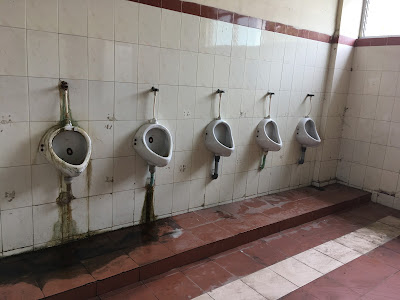Toilets, and holding power to account
"Why are you asking me all these questions? What has it got to do with the public?", barked the railway contractor on the phone.
I had just found out that workers manning the MRTS stations on a particular route were either not getting paid at all, or weren't getting paid much. After a bit of wrangling, I'd manage to get his number and called him. and that's when it got complicated.
I had told him I was doing a project on the toilets in the MRTS stations, which was true, but I was hesitant in asking him outright why he he paid his workers so little, because I didn't want the workers to get into trouble. He'd claimed that he was paying Rs.250-500 a day to the workers, but most got paid as little as Rs.2000-3000 a month.
 |
| It's actually cleaner than it looks. |
"What's the purpose of all this?", he asked.
"Sir, you're a contractor with the Railways, so you're doing a public service, right?"
He'd said only two minutes ago that he was a public servant of a sort.
"Yes, but how is it important?", he asked.
"Sir, labourers are public too, right?"
By now, he sounded annoyed and my broken Tamil wasn't helping either.
He has asked to meet me tomorrow at Chennai Central. I'm probably not going, but I do want to get to the bottom of this. How do we question those in powerful positions without putting those working for them in jeopardy?
Earlier in the day, another somewhat powerful man in the Railways had told his peon to tell me to "bring a female" with me when I went to talk to him. Is this one of the drawbacks of increased awareness of sexual assault? I'm not too sure. In any case, I got the information I needed, although from someone else, and while standing in the corridor.
I imagine spending more time in the same beat should ease problems like this, but it also got me thinking about what happens when you develop a good rapport with official sources. On the one hand, there's a chance that people in authority will get to know about corruption or problems and actually act to change things. But on the other hand, what if the sources are the ones who are corrupt?
Okay, I did see The Post recently, and that's why these ethical dilemmas have been weighing on my mind.
While speaking to all the workers who get paid a pittance to do work that many of us wouldn't ever do, my friend told me she wished there were more people who acted to make the world better.
Maybe it's better to be naive than a cynic. What say?



Comments
Post a Comment